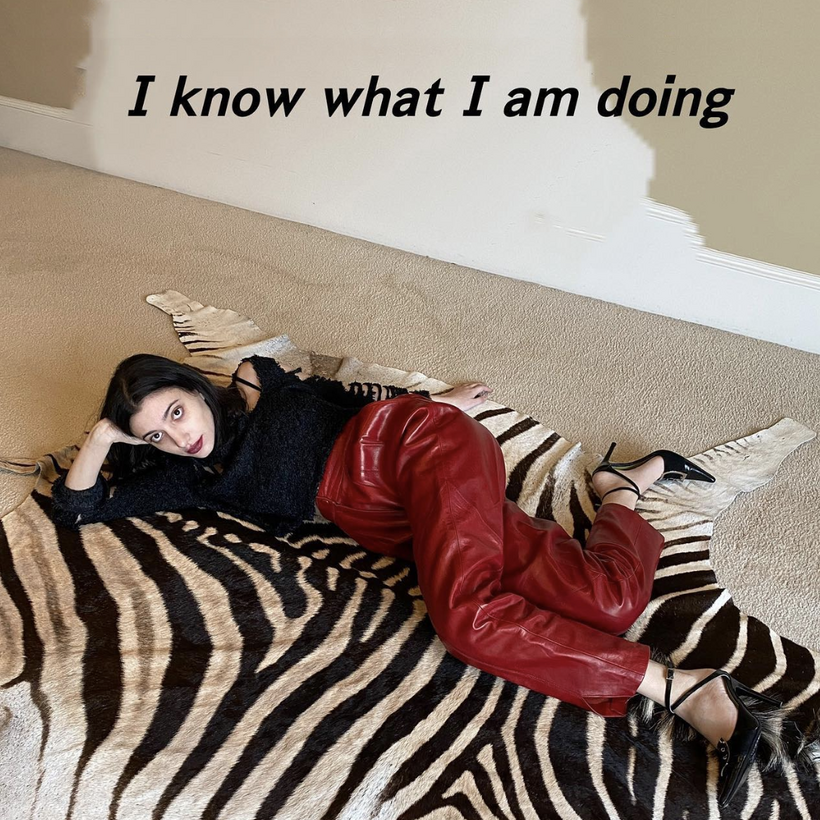Mika Kol and I ended up on the roof of the financial district’s Chick-fil-A. If you’ve never been, the restaurant spans five floors and offers a view of Fulton Street’s stone office buildings and the businesspeople who rush in and out of them. It’s one of Kol’s favorite spots in Manhattan.
As Kol, 23, puts it in her Instagram bio, she’s a “member of the merchant class.” She sells vintage clothes on the fashion platform Depop (her handle: @trustfundgoth). While Depop is often described as Gen Z’s alternative to resale places such as eBay, Etsy, and Poshmark, it’s actually more like a social-media app. Sellers have a personal page, reminiscent of an Instagram account, where they post photos of clothes and accompanying captions peppered with buzzwords meant to optimize search engines.

The ability to sell used clothes on Depop depends as much on someone’s personal brand as it does on the luxury brands they offer. Unlike top eBay sellers, top Depop sellers—such as Isabella Vrana (@bellavrana), Bella McFadden (@internetgirl), and Ari Kiko (@kikovintage)—have huge followings the same way Instagram influencers do.
Currently, Kol is selling Comme des Garçons, Pierre Cardin, and Emanuel Ungaro, among other designers, to her 24,000 followers. In about a year, she’s sold 781 items—from a Gucci dog tag to a Missoni hat. She photographs the clothes tossed on the floor, or models them, often taking the pictures at odd angles.
What sets her apart are her descriptions of the clothes. Unlike traditional product descriptions, hers are diaristic, charming, funny, and brutal—reminiscent of blog posts from the early 2000s. To sell a $350 Jean Paul Gaultier corset, she wrote a paragraph in which she imagines Kim Kardashian (who was once photographed in the corset) as First Lady. In the listing for a $600 hot-pink Vivienne Westwood bikini, she wrote, “I cannot picture something more desirable to get potential skin damage in than a hot pink Westwood bikini with an orb on the crotch.” Imagine Nora Ephron documenting her own estate sale.
Unlike traditional product descriptions, Mika Kol’s are diaristic, charming, funny, and brutal—reminiscent of blog posts from the early 2000s.
In addition to Depop, Kol works as a private clothing seller. Clients go to her FiDi apartment to browse her collection in person and drink wine. Her success both on- and offline is partly because she can anticipate what women want to wear.
Kol started selling clothes in the 10th grade. For most of her adolescence, in Houston, Texas, she wore a uniform. In high school, once she was free from the uniform, Kol started wearing pink Juicy Couture tracksuits every day. When Juicy Couture had a revival one year later, she flipped them on Depop. It started a cycle: for the rest of high school, she continued to buy relatively inexpensive brands she liked that hadn’t experienced widespread revivals, wore the clothes for a year, then resold them for more once they went up in value.
Right now, her style is “corporate woman.” To Chick-fil-A, she wore a delicate lace Alexander McQueen shirt. “If you live in a major city, it’s beneficial to dress in a way that makes you have to say a couple less sentences about yourself,” she says. For a twentysomething trying to make money in New York City, it’s a “pencil skirt, [a] shoe that’s comfortable enough for the office. I want it to look like a sexy-secretary movie.”

This year, she predicts the rise of “2008 recession core” because “we’re entering another recession.” She describes the style as “a more streamlined version of the mess that was 2008 to 2012”: skinny jeans, sequins, and metallics.
Kol considers herself a businesswoman, not a fashion archivist. After Etsy bought Depop for $1.6 billion last summer, she realized Depop was dying. Now she’s developing her own Web site to sell clothes and to blog.
When I asked Kol what her end goal was, she said, “Exiting fashion, making something in bioremediation, selling it, and then doing absolutely fucking nothing.” Could she actually leave fashion behind? She laughed. “No.”
Nicolaia Rips is the author of Trying to Float: Coming of Age in the Chelsea Hotel, a screenwriter, and an editor for HommeGirls

